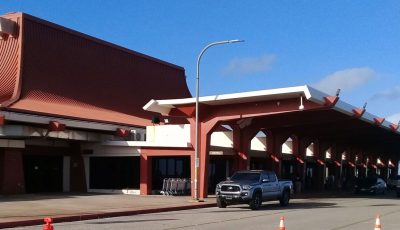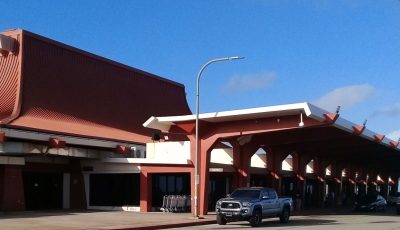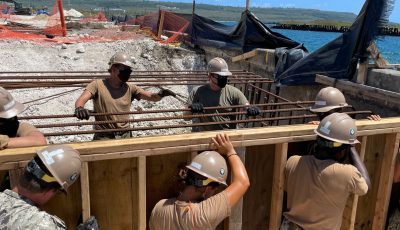GPPC sues CPA for $5M
Lawsuit is over ARFF training facility
GPPC Inc. has filed another lawsuit against the Commonwealth Ports Authority, seeking at least $5 million in damages for allegedly imposing an illegal penalty on the company despite it having already substantially completed building a new firefighting training facility at the Francisco S. Ada/ Saipan International Airport.
GPPC, through lawyer Mark B. Hanson, wants CPA held liable to pay no less than $5 million, plus damages, interest, and court costs, for alleged material breach of contract.
GPPC wants the Superior Court to declare that GPPC substantially completed the project by May 2016 and that the “liquidated damages” CPA imposed on GPPC is an illegal penalty.
GPPC wants the court to state that CPA made up false reasons to impose liquidated damages on GPPC and that such false reasons cannot stand.
The contractor believes it is entitled to be paid for the project, with all retention amounts due “without regard to CPA’s groundless, illegal, bad faith and fraudulent claim to contractual liquidated damages.”
CPA lawyer Robert T. Torres said he has not seen the complaint yet when sought for comments yesterday.
GPPC won the contract in January 2011 to build the new Aircraft Rescue and Firefighting training facility and other support infrastructure and the decommissioning and removal of the old Simulated Aircraft Fire Trainer at the Saipan airport.
Hanson said the contract change orders modified the scope of work at various times over the life of the project since the first notice to proceed in June 2011.
Hanson said the total contract price with all change orders totaled $17,433,830.
He said substantial completion of the project took about five years.
Ultimately, Hanson said, a new SAFT was successfully tested and commissioned in May 2016.
He said ARFF then began using the new SAFT facility for its training and certification exercises, including hosting regional training exercises with ARFF personnel from other jurisdictions.
By May 2016, the project was substantially complete, Hanson said.
By agreement amended many times, Hanson said, the project contracted in January 2011, was scheduled to be fully complete by Sept. 14, 2016 including the work added by all six change orders.
The lawyer said that just days after the last extension agreement, and despite GPPC’s substantial completion of the years-long project, CPA notified GPPC in August 2016 that it intends to impose contractual “liquidated damages” if, in CPA’s and its construction manager’s opinion, GPPC did not complete “all physical and turn over” of the project.
Hanson said that, according to CPA and its construction manager, the “physical and turn over” of the project expressly included “punch list items, cleanup, and final cleanup items,” “inspections and final inspections.”
He said CPA’s and its construction manager’s pre-contract close out demands of GPPC included, among other obligations, requirements that GPPC clean, repaint and repair commissioned work such as SATF’s wastewater treatment facility that was completed in 2015 prior to Typhoon Soudelor.
Hanson said just two days before the scheduled full contract completion date of Sept. 24, 2016, CPA’s construction manager made demands on GPPC for work outside the scope of the contract.
Hanson said CPA, its construction manager, and Torres, continued to posit false reasons for their claim that GPPC has not “fully and finally” completed the project.
In October 2016, Hanson said, CPA officially notified GPPC of its imposition of daily contractual liquidated damages in the amount of $2,500 from Sept. 24, 2016, extending indefinitely, based on its opinion that GPPC had not completed the project on time.
GPPC disputed CPA’s contract determinations.
Hanson said that, on Oct. 31, 2016, Torres informed GPPC that CPA would withhold retention amounts, despite being contractually obligated to release the retention amounts to GPPC.
Hanson said GPPC timely supplemented its contract dispute to include Torres’ illegal contract decisions on behalf of CPA.
The CPA executive director issued his decision denying GPPC’s contract dispute. GPPC appealed that decision to the CPA board.
Hanson said the CPA Appeals Committee denied GPPC the opportunity to call witnesses at a hearing, to introduce evidence and testimony, to cross-examine CPA or to otherwise contest CPA’s evidence.
The review, Hanson said, was limited to the record that CPA and its attorneys wanted and fabricated.
Hanson said after pending before the CPA Appeals Committee for more than a year, on Feb. 26, 2018, GPPC received the decisions of the Appeals Committee, affirming CPA’s decisions and that of its construction manager and Torres.
In its first lawsuit, GPPC accused CPA of causing the company to incur $39 million in damages over the Saipan airport runway project. CPA filed counterclaims against GPPC and a third-party complaint against an insurance company.
GPPC then moved to dismiss CPA’s counterclaims.
In October 2017, Superior Court Presiding Judge Roberto C. Naraja denied GPPC’s motion to dismiss CPA counterclaims.
In the same order, Naraja denied GPPC’s motion to dismiss CPA’s third-party complaint against a Maryland insurance company that provided the performance bond for GPPC.



























